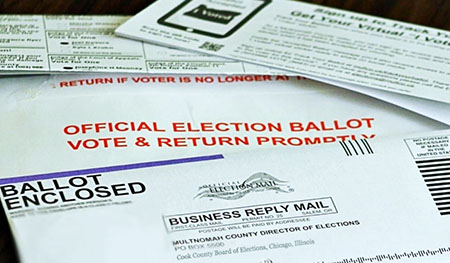by WorldTribune Staff, October 25, 2022
A federal court has rejected a motion by the Democratic Party of Illinois to intervene as a defendant in a government watchdog group’s lawsuit challenging an Illinois election law which allows mail-in ballots to be received up to two weeks after Election Day.
The ruling was made in the federal lawsuit Judicial Watch filed on behalf of Congressman Mike Bost and two other registered Illinois voters to prevent state election officials from extending Election Day for 14 days beyond the date established by federal law.
 “The Democratic Party failed to gum up this important lawsuit for election integrity,” said Judicial Watch President Tom Fitton. “We are supposed to have an Election Day, not Election Weeks – or months. Illinois’ 14-day extension of Election Day beyond the date set by Congress is illegal, violates the civil rights of voters, and encourages fraud.”
“The Democratic Party failed to gum up this important lawsuit for election integrity,” said Judicial Watch President Tom Fitton. “We are supposed to have an Election Day, not Election Weeks – or months. Illinois’ 14-day extension of Election Day beyond the date set by Congress is illegal, violates the civil rights of voters, and encourages fraud.”
The Democratic Party of Illinois is represented by former Hillary Clinton campaign lawyer Marc Elias.
In the court’s ruling and opinion on the Democrats’ motion to intervene, U.S. District Judge John F. Kness held that its participation would “delay this time-sensitive case:”
[Democratic Party of Illinois] cannot meet its burden to show that its interests will not be adequately represented by the parties to the case. As a result, [Democratic Party of Illinois] is not entitled to intervene as of right. Separately, because allowing [Democratic Party of Illinois] to intervene would threaten to delay this time-sensitive case further, the Court, in its discretion, denies [Democratic Party of Illinois] motion seeking permission to intervene as a party under Rule 24(b). Accordingly, the Court denies DPI’s motion in its entirety.
Federal law defines Election Day as “the first Tuesday after the first Monday in November of every even-numbered year.”
Judicial Watch points out that the current Illinois election law allows vote-by-mail ballots received up to 14 days “after the polls close on Election Day” to be counted as if they were cast and received on or before Election Day. Illinois law also provides that “[e]ven vote-by-mail ballots without postmarks shall be counted if received up to 14 calendar days after Election Day if the ballots are dated on or before Election Day.”
Judicial Watch noted in the lawsuit: “The Board … advised that the number of ballots received after Election Day through November 17, 2020, could materially affect the unofficial election results. [Illinois’ own data indicates that] Illinois received 266,417 vote-by-mail ballots statewide during the period from November 3rd through November 17th. [M]ost of the 266,417 vote-by-mail ballots were received after Election Day, which would mean that as many as 4.4% of votes cast in 2020 were received after Election Day.”
The Delaware Supreme Court recently struck down the state’s vote-by-mail and same-day voter registration statutes for violating the Delaware Constitution. In making its ruling, the court effectively concurs with the amicus curiae brief Judicial Watch submitted in the case, which argues the Delaware statute impermissibly expands those practices far beyond the limits set in the Delaware Constitution.
In a separate Judicial Watch election lawsuit against Illinois, a federal court ruled in June 2021 that the lawsuit could proceed against Illinois officials for denying public access to Illinois’ voter registration database.
In February 2022, Judicial Watch settled its voter rolls clean-up lawsuit against North Carolina and two of its counties after North Carolina removed over 430,000 ineligible names from the voter rolls.
In March 2022, a Maryland court ruled in favor of Judicial Watch’s challenge to Maryland’s Democratic legislature “extreme” congressional redistricting gerrymander.
Action . . . . Intelligence . . . . Publish
